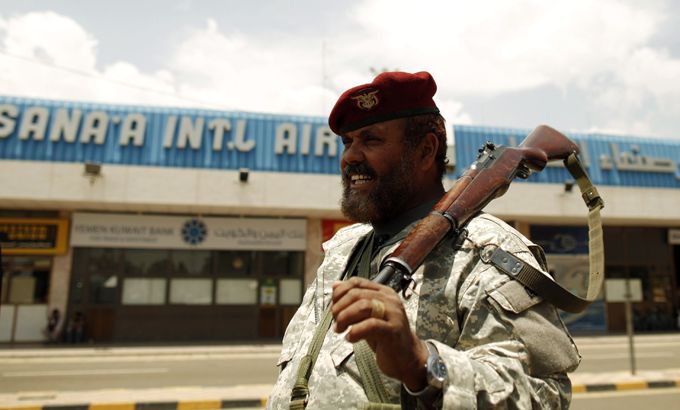
Power games in Yemen
We ask who is really in charge after gunmen loyal to the former president forced the closure of Sanaa’s main airport.
Ali Abdullah Saleh, Yemen’s former president, may no longer be in power, but it appears he still has his supporters.
Sanaa’s main international airport re-opened on Sunday after gunmen loyal to the former leader fired at buildings on Saturday, forcing authorities to shut it down in the most serious challenge so far to the reform efforts of the country’s new president.
Keep reading
list of 4 itemsFire engulfs iconic stock exchange building in Denmark’s Copenhagen
Inside the pressures facing Quebec’s billion-dollar maple syrup industry
‘Accepted in both [worlds]’: Indonesia’s Chinese Muslims prepare for Eid
|
“Without removing Saleh from Yemen totally, from interference with the new president, the Yemen dilemma will continue and we are going to see a chaotic situation in the next few months.“ – Munir al-Mawri, a Yemeni affairs analyst |
The attack came only one day after Abd-Rabbu Mansour Hadi, Yemen’s new president, fired officials who had been appointed by Saleh.
During his 33-years in power, senior positions were given to Saleh’s friends and relatives and that is something the new president is trying to fix.
Among the officials fired were Ali Abdullah Saleh’s half-brother, Mohammed Saleh al-Ahmar, who was the head of the air force, and Saleh’s nephew, General Tareq Mohammed Abdullah Saleh, who headed the presidential guard.
But some members of the old government remain in powerful positions: Ahmed Ali Abdullah Saleh, the former president’s son, remains head of the Republican Guard and Saleh’s nephew, Yahya Mohammed Abdullah Saleh, is still the head of the Central Security Forces.
It is a sign of just how fragile the situation is in Yemen, and critics wonder whether anything has really changed after more than a year of political unrest.
What does this power standoff in Yemen say about who is really in charge? And will anything change for the people there?
Inside Story, with presenter Hazem Sika, discusses with guests: Jamila Ali Raja, a former adviser to the Yemeni foreign ministry and an independent political analyst; Hussein Shobokshi, a columnist for Asharq Alwsat newspaper and a political analyst; and Munir al-Mawri, a member of the Yemeni National Transitional Council and a Yemeni affairs analyst.
|
“It is a classical power struggle. It is a new era that has been launched. There is a new president in charge, but there is a lot of people who have a lot [at] stake at this game-changing moment. We are seeing definitely the last episode of the leftovers of Ali Abdullah Saleh’s era …. I believe that we will see a change of faces as well as a change of policies.” Hussein Shobokshi, a columnist for Asharq Alwsat newspaper |
HADI’S MAIN CHALLENGES:
- The new Yemeni president must first restructure the military while ensuring he balances his promise to purge ex-regime elements from the security forces with not upsetting Saleh’s loyalists.
- He has to prevent al-Qaeda from taking advantage of the power vacuum – something already proving difficult. On Monday, more than 30 people were killed when an al-Qaeda-linked group attacked a military camp.
- He has to fix Yemen’s ongoing economic problems, including the fact that five million people suffer from a lack of food.